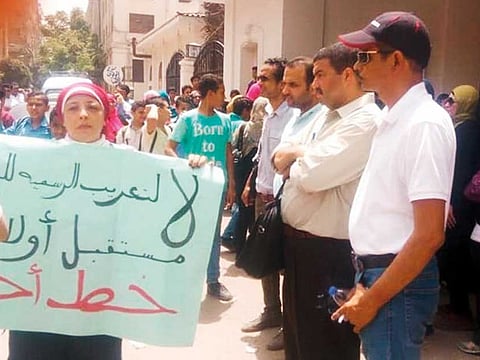Plan for school Arabicisation angers parents
Egypt education minister defends the move as aimed at preserving national identity

Cairo: A plan by Egyptian Education Ministry to revamp the country’s state language schools has triggered a public backlash. The scheme envisages teaching science and maths in Arabic instead of English as is the case now in the so-called governmental experimental schools.
At the same time, English will be taught as a separate foreign language starting at the kindergarten stage in these schools, which are popular with Egypt’s middle-class due to their affordable fees compared to private language schools.
The new system also includes teaching science and maths in English as well as a second foreign language starting from the seventh grade.
Dozens of angry parents on Thursday rallied outside the Education Ministry in central Cairo in one of rare street protests in the country in recent years. They raised placards reading: “No to Arabicisation”; “Our children are not a testing field”; and “Our children are a red line.”
Several lawsuits have also been filed to block the new system.
“A major advantage of the experimental schools is that students there study the maths and science in English,” said Wala Safwat, a mother of two schoolchildren.
“People send their children to these schools because they cannot bear the fees of the private language and international schools. When subjects are taught in Arabic in the experimental schools, they will lose their edge and become like the ordinary governmental schools.”
Mahmoud Farouq, a father of three children, agrees. “The main advantages of the experimental schools are teaching pupils in English, thereby qualifying them for the job market, and their small class size, compared to the ordinary governmental schools,” he said.
“When the experimental schools are cancelled, many of us will not be able to send our children to private language schools because of their high fees. Therefore, the only option is the ordinary governmental schools. This will widen the educational gap in the country and deal a blow to the middle class,” said Farouq, an employee at a private travel agency.
Egypt has some 850 experimental schools, which admit children from the kindergarten up to the pre-university stage.
Education Minister Tareq Shawqi has defended his plan, saying it is aimed at preserving national identity and providing a quality education in state schools. “Our aim is not just Arabicisation, but a new comprehensive system that puts our governmental schools at a world level and stops us from seeking other types of education,” Shawqi, a university professor, said in a press statement.
“A second foreign language will be introduced in the seventh grade. So, by the time, students complete the pre-university education, they will be perfect in the native language, have a clear [national] identity and a good command of two foreign languages,” added Shawqi, a self-styled education reformist.
The contested system is set to take effect starting from next school year, applying only to kindergarten children.
“This development will take years to fulfil, beginning with the kindergarten stage until the end of the secondary schooling,” the minister argued.
Some parents have voiced backing for Shawqi, who has been in office since February last year.
“The people are angry with the education minister because he wants to teach their children the language of their homeland. How funny!” said Marwa Al Sayed in a Facebook post.
“The minister has said that the mother language will be taught along with a foreign language at the primary school. Afterwards, teaching will be in English. Where is the problem then?” she added. “Is there a country in the world that does not teach its mother language in its schools?”



